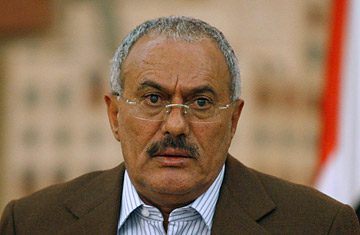
Yemeni President Ali Abdullah Saleh.
Al-Qaeda is many things except "convenient" — unless you are Yemen's President Ali Abdullah Saleh.
Until the tide of Arab revolution swept into Yemen, the United States' primary concern with the impoverished south Arabian nation was a growing threat from al-Qaeda. And not without reason: more than any other al-Qaeda franchise, Yemen's Al-Qaeda in the Arabian Peninsula (AQAP) has been able to muster attacks far from the rugged terrain of their base, twice targeting American soil in recent years. Saleh has always boasted that only his firm grip over the regime will keep al-Qaeda from taking over Yemen. Nevertheless, until just a few days ago, the group has been relatively quiet since protesters began calling for Saleh's departure.
But as Saleh tried to maneuver against military defectors and opposition gains, AQAP was suddenly back in the news. Over the weekend, government soldiers were killed in the provinces of Marib and Abyan, all known as AQAP havens. Then, on Sunday, an ammunition factory in Jaar, Abyan, was abandoned by soldiers and then stormed by looters, leading to an explosion that that claimed more than 100 lives after someone apparently lit a cigarette in the building. Nevertheless, said the state-run news agency Saba, "Al-Qaeda is laden with full responsibility for this incident."
On Wednesday, almost on cue, the fifth issue of AQAP's English-language magazine Inspire began circulating on jihadi forums online. The latest from AQAP's prolific media arm focuses on the Arab uprisings, perhaps the first time al-Qaeda has dealt with the subject. The cover story ("The Tsunami of Change") was written by the radical American cleric Anwar al-Awlaki. It is a broad refutation of international perceptions that the largely democratic movements will strike a blow to Al-Qaeda. "The outcome doesn't have to be an Islamic government for us to consider what is occurring to be a step in the right direction," Awlaqi writes. "Whatever the outcome is, our mujahidin brothers in Tunisia, Egypt, Libya and the rest of the Muslim world will get a chance to breathe again after three decades of suffocation." According to Awlaki, Yemen may be the country where extremists stand to gain the most.
Does this mean AQAP is about to play a larger role in Yemen's turmoil? Many critics are skeptical, pointing out that the lawlessness in the countryside is more the result of the regime's weakness rather than the militants stepping up their activity. Some reports indicate that Saleh's government ordered its elite soldiers out of Abyan (and thus the munitions factory) for no clear security reason, creating a vacuum that local powerbrokers — including al-Qaeda — might potentially fill. They point out that the Saleh regime has increasingly loose control over the provinces. Indeed, elements of the political opposition have taken over government buildings in Marib, Al-Jowf and Abyan provinces as workers abandon their posts. The President maintains control mainly over the capital and major urban centers; other parts of the country have already been throwing off the vestiges of his 32-year long rule.
Many Yemenis also feel that that AQAP's resurgence fits into the government's narrative of Saleh's indispensability a little too well. For weeks, Saleh's regime has teetered on the brink of collapse. Then, as the President appeared to engage in talks with his opponents, a massive crowd of loyalists turned out to hear Saleh speak on Friday. He magnanimously announced that he was ready to hand over power — but only to the right people. By the following day, the talks had stalled and Saleh was once again staying put. And now, the regime has raised allegations of al-Qaeda mischief, particularly with the Jaar explosion.
The President's supporters — including those in the U.S. — see renewed AQAP activity as a reason for Saleh to stay in power. But many Yemenis feel that the government exaggerates the threat posed by extremism. "People throughout Yemen see Ali Abdullah Saleh trying to use this incident as a reason to remain in power," said Mohammad Al-Sabri, a spokesman for the Joint Meeting Parties, a coalition of opposition parties. "There has been a strange sort of unison between the actions of Al-Qaeda and the needs of the government over the past 10 years," says Abdul Ghani Al-Iryani, a leading political analyst in Yemen.
Nevertheless, the turmoil may yet tempt AQAP into doing more. "The longer Yemen's political crisis goes on, the weaker the Yemeni government looks," says Christopher Boucek, a Yemen analyst at Washington's Carnegie Endowment. "And this gives Al-Qaeda more space to operate." And the U.S. is clearly concerned. Appearing Sunday on ABC's This Week, Secretary of Defense Robert Gates expressed deep concern about the prospect of a post-Saleh Yemen. "We have had a lot of counterterrorism cooperation from President Saleh and Yemeni Security Services," said Gates. "So if that government collapses or is replaced by one that is dramatically more weak, then I think we'll face some additional challenges out of Yemen. There's no question about it. It's a real problem."
Bringing AQAP back to the main stage doesn't necessarily mean that Saleh is planning to stay, says Boucek, but it could give the president the leverage he needs to depart on his own terms. "This is a card that the regime has played often," says Boucek. "What they are saying now is that if we do not manage this transition in an orderly way, there will be chaos, and from that chaos, the groups that benefit are Al-Qaeda and other extremist elements." It is a big bet by Saleh. Al-Qaeda may be a convenient threat — one that the Yemeni President's foreign supporters may recognize. But to the military and civilian opposition on the domestic front, Saleh remains the greater threat.
